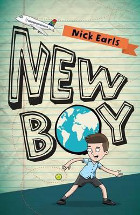New boy by Nick Earls

Penguin, 2015. ISBN 978114330839 3
(Age: 10+) Highly recommended. South Africa, Isolation, Language,
Change, Bullying, Racism. Herschelle has read all he can about
Australia and in particular the differences in the language to his
home in South Africa. He thinks he has it all covered, but makes
mistakes from the minute he steps into his new school in Brisbane.
He notices differences too: the lack of security, the sea of white
faces looking at him, the efforts by the teacher to help him fit in,
the nerd he is given as a buddy to show him around the first day.
With nods to They're a weird mob (Culotta, 1957)
Herschelle's attempts at using Australian words and phrases learnt
from the web are embarrassingly funny, causing hilarity amongst his
peers when he uses phrases he has read, and he has equal difficulty
in understanding them.
The language references will cause laughter amongst the readers, but
the story of his fitting in is one most will recognise as a
sometimes tortuous experience. And behind the problems his family
encounters, with Dad working at a mining camp miles away, are hints
of what happened in South Africa to make them move to Australia.
Herschelle is targeted by a group of bullies, their leader taking
personal interest in him because of his accent. When his mother
invites his buddy, Max and his family to a barbecue, she serves some
South African food, but this causes further embarrassment at school,
with Max bullied into giving them some ammunition, until finally
Herschelle and the bully come to blows.
A resolution of the problems occurs with Herschelle giving a talk
about his home town to the class, and when an opportunity is given
to include the bully in their game of handball, he accepts.
This is a story which reflects the concerns of every child moving
school, but compounded when Herschelle looks and sounds the same but
his accent is something to be derided. A wonderful twist sees
Herschelle and Max being buddies to a new boy in school the
following term, a refugee from Somalia.
The book has layers of interest to hold the reader: not only an
engrossing story of fitting in, of being accepted, but one of
bullying, of difference, of racism and prejudice.
The reasons the family left South Africa leads the author to explain
the path that country is taking to heal the wounds of Apartheid, and
readers will be shocked by the differences Herschelle sees in
Australia. A nice contrast too is evoked when he skypes his friend
back home. And the food Mum prepared was so interesting that I
needed the internet.
I think this book would make a great class set for upper primary
groups, introducing racism and bullying as topics to discuss,
reviewing what happened in South Africa under Apartheid, the efforts
made to end it and its legacy in the twenty first century.
Nick Earls gives a fascinating explanation of just how his own
experience as a new boy from Northern Ireland led to the writing of
this book, another level of interest which an astute teacher could
use with a class.
Fran Knight